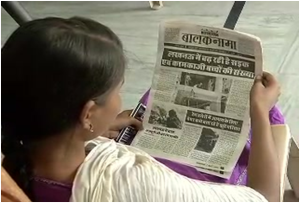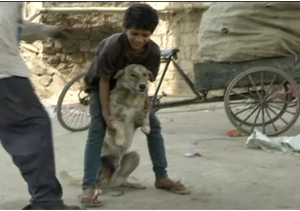THEIR VOICES: BALAKNAMA, news from Delhi and area slums
A newspaper by street children reports on lives and problems of slum dwellers

- ‘Balaknama’ is auto biography of childhood on the streets of cities. Photo courtesy: Bipasha Kundu
Shambhu is on the hunt. The 16 year old is prowling the underbelly of his neighborhood in the slums of Delhi looking for his source, Faizan. Under the busy Barapullah flyover, beside the stinking nullah, 11 year old Faizan is busy playing cards and sniffing at his handkerchief. Hearing Shambhu’s voice he gets up. Moti too gets up from his slumber and follows his master, Faizan
Shambhu is looking for a story. His deadline is in an hour. And Faizan has all the details.
Shambhu and Faizan are the reporters of ‘Balaknama’, a newspaper run by Chetna, (Childhood Enhancement through Training and Education), an NGO that works to empower street children. Shambhu as chief reporter, he relies on the eyes and ears of Faizan, a Batuni reporter or oral communicator.
Together they work on stories that only a child living on street can find and report. The newspaper binds them and supports them.
“We are treated as genetic garbage. Nobody bothers about us. But if we are not well, the city can’t be well either” says Shanno, the consulting editor of Balaknama.
Shanno worked as a child laborer in a factory making bangles before she got involved with Chetna and then Balaknama.
The newspaper gave her confidence and made her aware of the plight of other children living on the road or in the slums. “I realized I was the best of the lot. I had home and parents and family. But there were others who had nobody,” says Shanno. While she became their voice, these children taught Shanno the importance of education in life.
BALAKNAMA: THE STORY OF CHILDHOOD LOST IN URBAN POVERTY
Born in 2003 out of the need to give street children a voice, Balaknama was published bi-weekly. Lack of funds forced it to go monthly and now bi-monthly.
“But our readership has gone up from 3000 to 5000 this year,” says Sanjay Gupta, chairman of Chetna.
Children who are illiterate or can’t write, like Faizan, become ‘batuni’ or the oral communicators. Those who can write, like Shambhu, are reporters. They receive a stipend of Rs 5000 per month for their travel and studies.
Nearly all children involved in Balaknama are students of National open school centres run by Chetna.
THE PAIR: FAIZAN AND MOTI
Faizan is a rag picker addicted to sniffing correction fluid, also known as white liquid. His rickety frame is eaten away by drug abuse.
His ‘masi’ (a self proclaimed supervisor) allows him to live under Barapullah bridge in south Delhi.
“She gives him a blanket and also supplies the drug. He in exchange pays her what he earns from rag picking,” says Shambhu.
“I ran away from home because my father used to beat me up. The boy I ran away with has gone back home but I stayed back on these streets near Nizamuddin Railway station,” Faizan says with a smile on his face.
The streets have made Faizan mature beyond his 11 years. The area where he lives is notorious for crime and he has been witness to many incidents so far.
“I have Moti to guard me,” Faizan says, looking at the mongrel. Then in a swift movement he grabs Moti and forcefully opens his mouth. Moti wriggles away and Faizan bursts out laughing. He pulls out a handkerchief from his pocket and sniffs then becoming conscious of being looked at, tries to hide it.
“He is a good reporter. With Moti around he can go anywhere and get me all sorts of stories,” says Shambhu. “We are working on a murder story that happened a few days before beside the nullah,” adds on the chief reporter of Balaknama.

- Faizan and Moti tell their tale to Balaknama. Photo Courtesy: Bipasha Kundu
Chetna hopes that the pride of being a reporter for Balaknama and the association with role models such as Shambhu and Shanno will help Faizan to break his addiction one day.
Faizan says he has taken the first steps. “I have reduced it and I promise to give up in few months. I have given a word to Shambhu dada.”
The Association with Balaknama has opened up a new world for Faizan. His dream is to be a dancer and work in a hotel to support himself and his family.
JYOTI IS A ROLE MODEL FOR FAIZAN
At 16 Jyoti has fought drug addiction and poverty. “I used to be so drugged that I couldn’t care less about who did what to me. I wasted myself,” Jyoti recalls.
Chetna rescued her from the platforms of Nizamuddin station and forced her into a rehabilitation center. Only when the drugs started to leave her body did Jyoti realize she had a future.
“I wanted to dance. And I wanted to live. My problem is I hate studies but to stay away from this pinhole I have no choice but study and work for Balaknama,” says Jyoti with a glint in her eyes.
Now Jyoti wants to help other children to come out of this life as a delinquent and live life with dignity. She signs off saying, “I am a reporter of Balaknama. I can never go back to doing what I used to.”
Wonderful effort. All the Best.
ReplyDelete